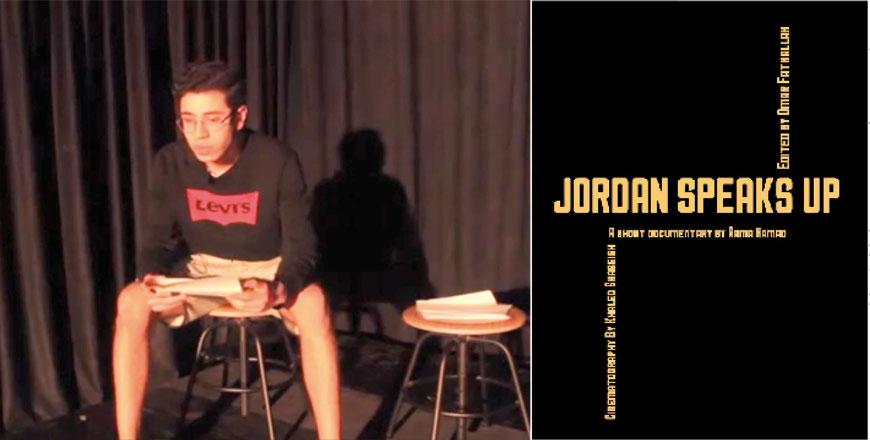You are here
Documentary stirs discussion, gives voice to victims of harassment
By Johanna Montanari - Oct 16,2019 - Last updated at Oct 16,2019

‘Jordan Speaks Up’ documentary, in which youth read aloud stories of people who faced harassment, stirred conversation about sexual harassment in Jordan (Photos courtesy of Jordan Speaks Up)
AMMAN — A short documentary published on YouTube on Friday titled “Jordan Speaks Up” stirred conversation about sexual harassment in Jordan and inspired many to share their stories under #JordanSpeaksUp on Twitter.
On Tuesday, the video had more than 17,000 views.
Rama Hamad, a 17-year-old girl from Amman, directed the movie, in which young people read stories in English of sexual harassment others had experienced and were given the chance to comment on those stories.
The documentary, filmed by Khaled Ghobish and edited by Omar Fathallah, calls for “breaking the silence and overcoming the fear of disclosing harassment incidents”.
What followed were many more stories shared on Twitter just like the ones read in the film.
In the film, the victims describe their inability to react, say “no” or defend themselves due to shock and fear.
“This topic is taboo in Jordan and in Arab and Middle Eastern culture,” Hamad told The Jordan Times on Tuesday.
“We made the film in English, because this is a local issue, but it is also much bigger — a global issue in every place in the world. So I thought using a universal language like English would reach more people and have a bigger impact, while at the same time, the film also targets the Jordanian community, as we included Arabic subtitles,” Hamad explained.
“The idea for the film began when I noticed more and more stories of people who were put in situations they had no control over. They were traumatised forever, while the perpetrators go on with their normal daily lives without shame,” Hamad noted.
Asma Khader, president of Sisterhood Is Global Institute Jordan (SIGI/J), said: “This topic is not new, neither to Jordan nor to humanity. We need young people to talk about this topic and all those who are struggling for human rights.”
“I feel there is a culture of victim-blaming in Jordan and more conservatism as a solution. There is culture of placing the burden on the shoulders of the victim, whether boy or girl, because men can also be victims of sexual harassment,” Khader told The Jordan Times on Tuesday.
In December 2018, SIGI published a report indicating that, according to figures released by the Criminal Information Department, there were 145 rape cases and 1,001 sexual assault incidents in 2017 in Jordan and as most incidents are not reported, the numbers are probably much higher.
#JordanSpeaksUp resembles the #MeToo movement, which went viral in October 2017 around the globe after sexual-abuse allegations by actresses emerged against former American film producer Harvey Weinstein.
“I think the authenticity and rawness of the video allowed a lot of people to relate to it, more than when celebrities are involved,” said Hamad.
Hamad told The Jordan Times that the film also received negative feedback, and that the most prominent critique voiced was that it “tarnishes” Jordan’s reputation.
“I prepared myself for critique because it is a controversial topic,” Hamad said, explaining that “the main controversy is that we have our traditions and we have our culture, and we would like to believe that our values prevent such things from happening, but in reality they are happening”.
“No, the image of Jordan will be harmed if we continue denying the fact that there is such a problem, and if we don’t support victims to speak up and ensure that they get the appropriate support and help. And the perpetrators need to be stopped through clear, legal measures,” Khader emphasised.
Related Articles
AMMAN — Women activists on Monday said the reason behind the drop in the number of reported rape cases last year in comparison with the year
AMMAN — A local study revealed on Tuesday that one in two female survivors (57 per cent) of sexual assault hesitate to file a complaint agai
AMMAN — Seventeen years after the publication of the United Nations Security Council Resolution 1325 (UNSCR 1325) on women, peace and













